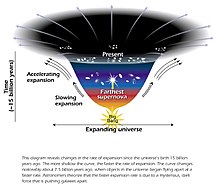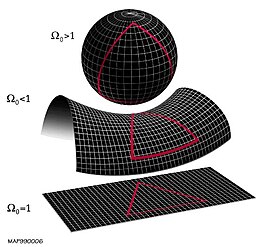
Physical cosmological concepts
3 episodes
Episodes in this category also belong to the following categories:
Dark Energy
Melvyn Bragg discusses the recently discovered, and mysteriously named, 'dark energy' which may make up 70% of the universe.
17 March 2005
Featuring: Martin Rees, Carolin Crawford, Roger Penrose
The Age of the Universe
Melvyn Bragg and his guests discuss a question which has obsessed cosmologists for millennia: how old is the Universe?
3 March 2011
Featuring: Martin Rees, Carolin Crawford, Carlos Frenk
The Universe's Shape
Melvyn Bragg discusses shape, size and topology of the universe and examines theories about its expansion. If it is already infinite, how can it be getting any bigger? And is there really only one?
7 February 2002
Featuring: Martin Rees, Julian Barbour, Janna Levin


